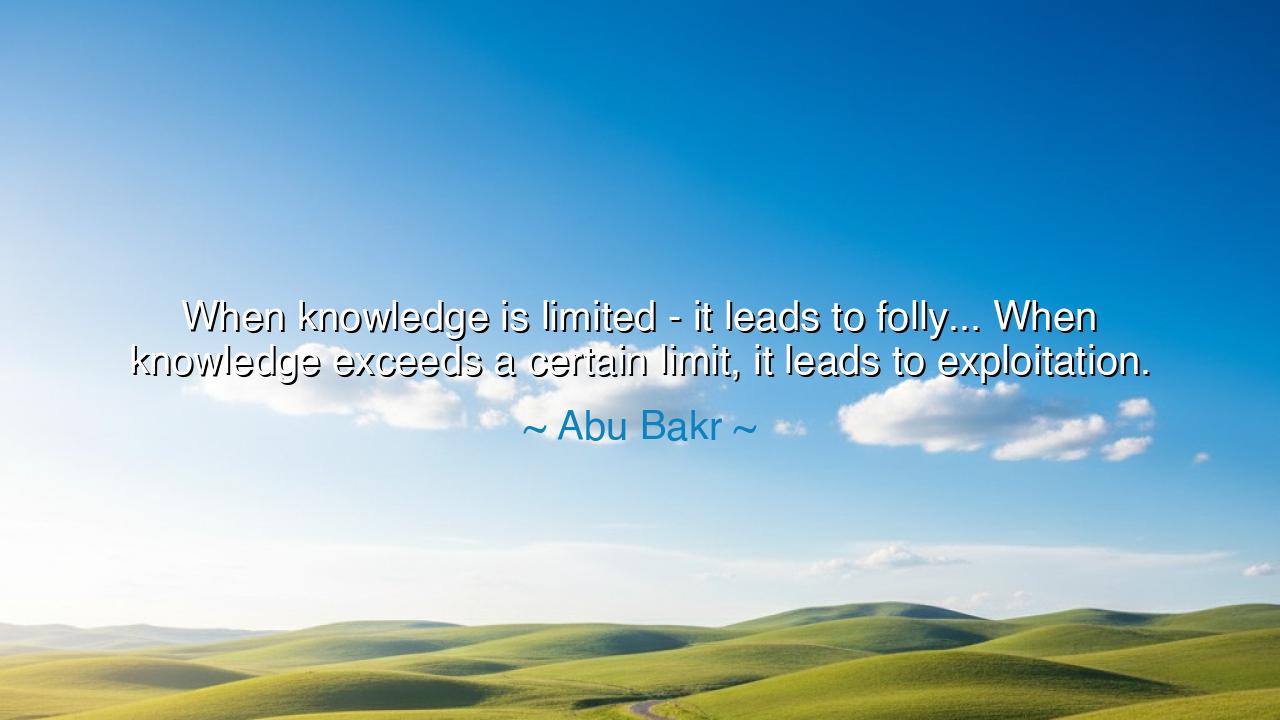
When knowledge is limited - it leads to folly... When knowledge
When knowledge is limited - it leads to folly... When knowledge exceeds a certain limit, it leads to exploitation.






The words of Abu Bakr, the first Caliph of Islam and a companion of the Prophet Muhammad, burn with the brilliance of wisdom: “When knowledge is limited – it leads to folly… When knowledge exceeds a certain limit, it leads to exploitation.” In this saying, he reveals the paradox of knowledge: that it is both light and fire, both salvation and danger. For too little knowledge blinds men to truth and makes them stumble like children in the dark, but too much knowledge, unchecked by morality, tempts men to manipulate, dominate, and exploit their fellow beings.
The origin of these words flows from Abu Bakr’s life at the birth of a new community. In his time, Arabia was moving from ignorance into a new age of faith and order. He saw clearly how ignorance—scarcity of knowledge—led tribes to superstition, needless bloodshed, and foolish quarrels. But he also foresaw a deeper danger: that when knowledge grows without humility, when men grasp too deeply into the mysteries of power and nature without guidance from justice, that knowledge itself can be twisted into a weapon. Thus his words remain a timeless warning: the pursuit of knowledge must be bound by virtue.
History has confirmed this truth. When knowledge is limited, men fall into folly. Consider the plague years of medieval Europe, when lack of medical knowledge led people to believe sickness was caused by curses or ill humors. Innocent communities, like the Jews, were scapegoated, and rivers of blood were spilled in folly because truth was absent. Yet history also shows the other side: when knowledge exceeds a certain limit without wisdom, it breeds exploitation. The atomic bomb, born of the most brilliant science of the twentieth century, became an instrument of death, unleashing destruction so vast it scarred the conscience of humanity. Knowledge, when unchained from morality, is more dangerous than ignorance itself.
The words of Abu Bakr also remind us of the ancient tale of Prometheus, who stole fire from the gods and gave it to mankind. Fire, like knowledge, could warm and cook, but it could also burn and destroy. In every generation, the question arises: will humanity wield knowledge for creation or exploitation? The story is eternal, for every new discovery—printing press, electricity, nuclear energy, artificial intelligence—carries the same double-edged power.
O children of the future, hear this wisdom: knowledge is never enough by itself. It must be balanced by humility, compassion, and reverence for the Creator and His creation. Without humility, a little knowledge makes a man arrogant, mocking others while stumbling in error. Without compassion, great knowledge makes a man cold, using his genius to exploit rather than uplift. Abu Bakr calls us to remember that the highest knowledge is not mastery over others, but mastery over oneself.
The lesson is luminous: seek knowledge, but seek it rightly. Do not remain content in ignorance, lest you fall into folly, but do not chase knowledge without bounds, lest you fall into exploitation. Anchor your learning in ethics, faith, and justice. Let your education make you a servant, not a tyrant. Let your discoveries heal, not harm. The true purpose of knowledge is not to exalt the self, but to guide humanity closer to truth, balance, and peace.
Practical action lies before you: study diligently, but temper your learning with humility. Before applying knowledge, ask, “Will this serve others or exploit them?” Support education that uplifts all, not just the powerful. Teach children not only facts and skills, but also wisdom and compassion. In every field—from science to politics, from art to commerce—bind knowledge to conscience, so that it becomes light, not fire, in the hands of humankind.
Thus let Abu Bakr’s words echo across the ages: “When knowledge is limited – it leads to folly… When knowledge exceeds a certain limit, it leads to exploitation.” Take them as both warning and guide. For knowledge is a mighty river, and only when steered by the banks of virtue will it give life; but without those banks, it will flood and destroy. Seek knowledge, but walk always with wisdom, and you will build a future that uplifts, not exploits.






AAdministratorAdministrator
Welcome, honored guests. Please leave a comment, we will respond soon